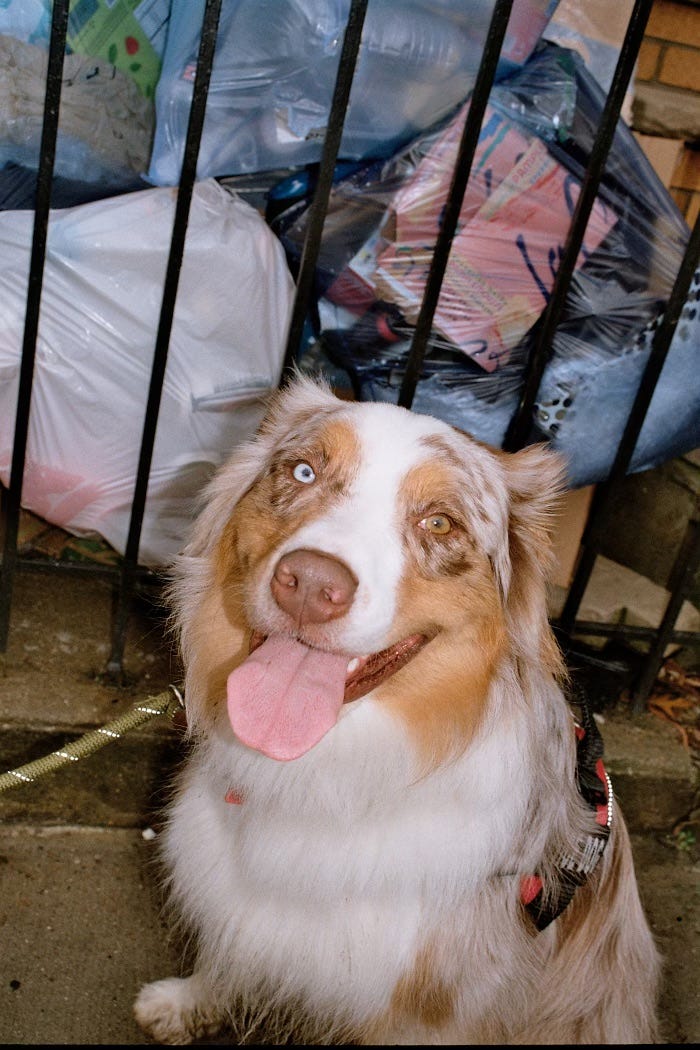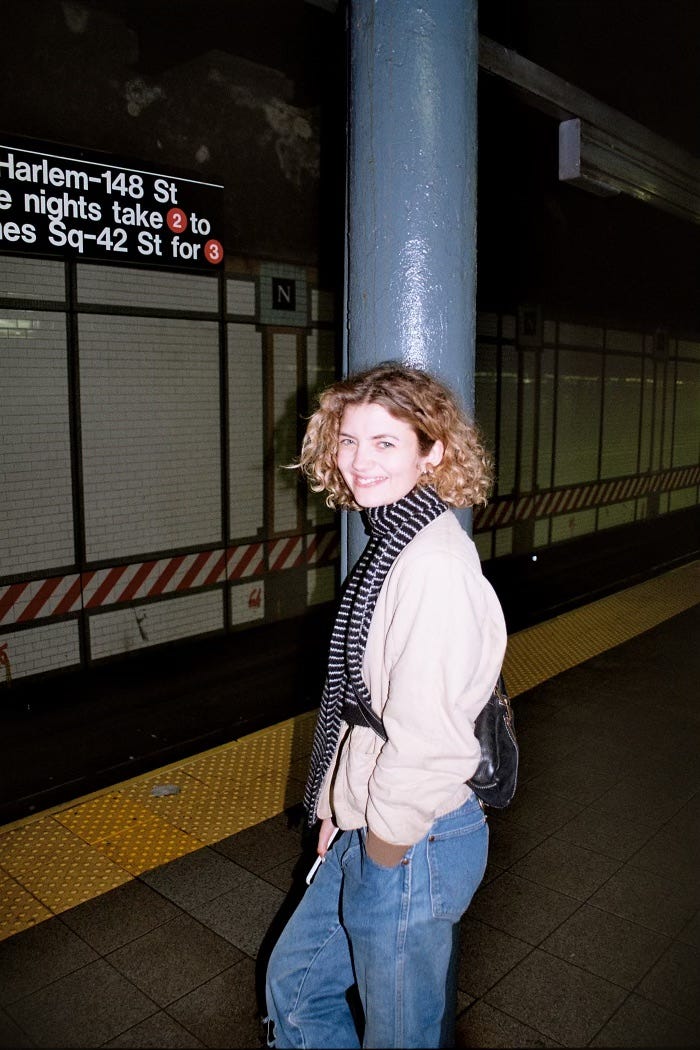zoe on thursdays is a monthly newsletter sharing zoe’s most recent fiction & non-fiction writing, a reading recommendation & a writing prompt.
Dear reader,
This month, I started Grubstreet’s Jumpstart Your Novel class with only a vague novel idea from a short story I had written. Before taking this class, I had no idea how people actually wrote novels. When I thought of novel writing, vague images of older men drunk off whiskey and writing by candlelight came to mind. Or, a woman dressed all in white cooped up in a secluded cabin with her dog at her feet.
Christine Meade, the writer leading the Grubstreet class, shared a deliciously formulaic and encouraging approach to novel writing. The beginning of the novel sets up the world and the primary characters. The inciting incident is the moment when the status quo changes for the main character. The middle section is the meat of the novel where the protagonist is battling setback after setback to reach their goal. Both the character’s desire to reach their goal and the stakes of not reaching the goal rise until the climax. The climax, the ultimate challenge the character has to face, launches you into the end where the character walks off into the proverbial sunset. Lessons learned and primary conflict resolved.
After learning about this common architecture of a novel, I saw this formula in so many of my favorite books. It gave me optimism that I could write and complete a novel draft for the first time. As the teacher of my course insisted, brainstorm the movement of your characters within this formula, pick a time to write each day and don't look back, don't read your work and don't stop writing until the end.
The night after learning about this formula, I met up with some friends. Antonio, who thinks he's capable of finding an answer to almost anything, began detailing a two hour conversation he'd had with ChatGPT — one of the AI bots taking the internet by storm. Antonio was the sole tech worker in this conversation surrounded by three writers. Two of us hadn’t yet heard of ChatGPT. As Antonio described his interaction with ChatGPT, Madeline interjected urgently, “Wait wait. What's chatGPT?”
Antonio quickly responded, “So you just plug in like anything you want it to write, it could be a question, it could be like a tweet, an MOU, a contract, a short story and it'll write it for you. It's so good."
Madeline's eyes increasingly widened and she grabbed her phone. Her job includes writing copy for political campaigns and nonprofits seeking funds. She asked ChatGPT to write a series of tweets explaining the necessity of renewable energy from the perspective of a rural voter. ChatGPT instantly produced tweets fairly similar to what she would create.
Another friend in the living room, a writer, Travis, chimed in, "I asked it to write me a short story about two gay boys living in Mexico City and falling in love."
“And??” we all asked collectively.
"Eh it was fine,” Travis responded. “It was missing some heart."
Missing some heart. As I looked further into ChatGPT on my laptop later, I found a college student who, in his basement over winter break, had generated a software that could determine whether something was written by ChatGPT or a human. Reddit threads were quick to call him a loser and a narc for creating a software that teachers could use to detect papers written by ChatGPT instead of by their students. It made me wonder how exactly his software would be detecting AI in the writing. How could a machine decipher the humanity or lack of humanity in another machine’s writing? How can any of us feel the humanity in a written word?
In the winding conversation we had at Antonio's, we came to the conclusion that perhaps the humanity in ChatGPT is found in the questions you ask. The better the questions you ask, the better the output is.
But that didn't feel quite right. Learning about the formula of novel writing made me optimistic that I can write and complete a novel. But the formula gave me pause as well. It left me with questions like - Am I much better than chatGPT by operating on a formula? What other methods of long form writing are there? I recently read a piece on feminist narratives. The argument was that so much of the formula of plot is tied to one structure in nature - the arc. Beginning-climax-end. It also mirrors the typically masculine sexual experience. The writer asked; what other forms of storytelling can there be? What about spirals or loops?
I haven’t come to any sort of conclusion on ChatGPT or the human tendency to write formulaically. What reminds me of my own humanity is my ability to ask questions - can I write something pulsing with my own heart and my own perspective within a formula? When will the line between AI writing and human writing become so blurred I'll feel the need to take a more significant stance?
In my Something to Read section this month, I recommend “Ghosts” by Dolly Alderton. Yes, the book follows a somewhat formulaic plot structure with the inciting incident "she gets ghosted" leading into many subplots tied together perfectly (and at the end with all her lessons learned). I don't know Dolly personally, obviously. The details of this book felt so specific that they had to come from the intimacies of a life lived by a woman in her 30s who had watched her friends’ lives diverge and flatten with the urgency to fold oneself into long term monogamy by any means necessary. It was pulsing with her voice and her heart.
Today, I'll share the first 500 words of my recent short story that, during this month’s novel writing class, snowballed into a full outline for a novel. It feels like a story only I could write, but maybe I'll submit the outline into ChatGPT later and see what it can come up with. Right now, ChatGPT refuses my request, saying it's at capacity. Clearly, we've found some use for it.
February Fiction Sample: 500 words from my new short story “Wannabe Cowgirl Killing”
I’d seen the inside of rooms where suspects are questioned a hundred times on Law & Order and late night movies on TNT. This one was smaller than in the movies, the size of a glorified coat closet. It shouldn’t have surprised me that it was so small. We were in a rural county in Idaho where hardly anything ever happened. This police station covered a wide swath of rural county in northern Idaho the size of Delaware that was frozen three seasons, thawed out only for the summer camping season.
As I sat across from Josh and Kyle, the two cops tasked with questioning me, I tried to take stake of the things that were real. The cold sprite against my palm, the lukewarm chicken nuggets in the red paper casing recognizable around the world. Josh and Kyle had taken me to Mcdonald’s during a break in questioning. They didn’t handcuff me or anything, just walked on either side of me.
The two cops doing all of the questioning were direct foils of each other like any properly cast dynamic duo should be. But something was slightly off. In the movies, one would be short and fat and the other would be tall and skinny. One, Josh was short and skinny. In his jean shirt with snap buttons and faded wranglers with the circle mark for dip, he looked like a kid playing dress up as a cowboy. He couldn’t have been more than 125 pounds. I noticed that he kissed the fat secretary who scanned my ID when I first came in. Wasn’t it inappropriate for them to kiss at work? Did police stations this dilapidated even have an HR department? Not that I knew that much about HR. I was still at my first and only job, working at the University of Montana’s sprawling lab.
Josh had gotten her an extra large fries and a soda he had to carry with two hands. Her cheeks were flushed pink and she wore a Garth Brooks concert tee under a white fleece vest. I wanted to be her friend. I also kind of wanted to watch them have sex. He seemed tender. I wanted that for her. I wanted to be loved like that someday. Currently, me and being loved felt like two different planets. I lived on the planet of cold blue and white numb waiting for the grief to come until the grief did come in splashing pails of bright puke green. This whole bit at the police station added blotches and blooms of bright red. This all can’t be my fault, can it? Brody dying can’t be my fault, can it?
something to read & something to write
something to read:
something to write:
Grab a paper and pen or open a blank google doc. Set a timer for 15 minutes and write your answer to this prompt. Don’t read what you’ve written and don’t stop writing until time is up. Show & Tell: You are put back in the sixth grade classroom of your child self. Adult you gets to do a show and tell for child you. What do you show? What do you tell?
Thank you so much for reading. Until next month!
Love, Zoe
P.S. Me and Sunny successfully completed our move! Some pics to prove it -





